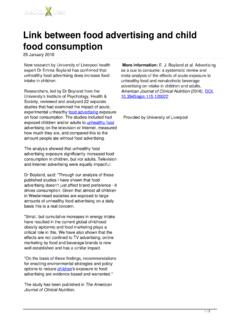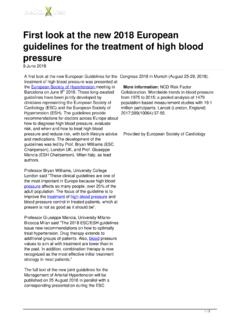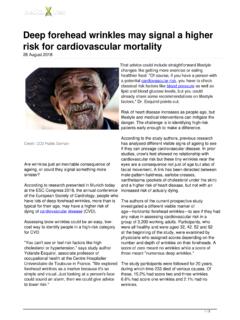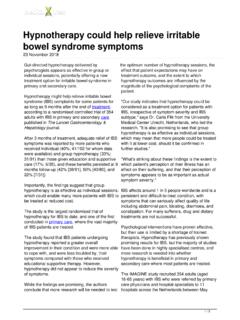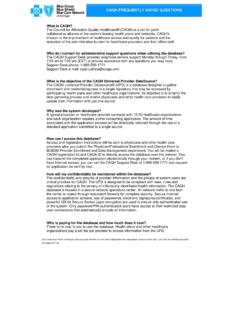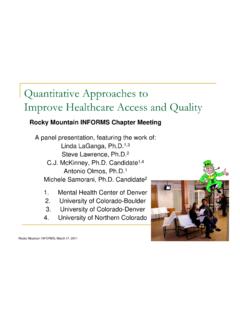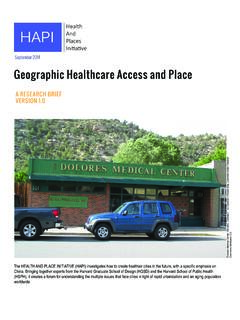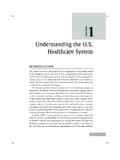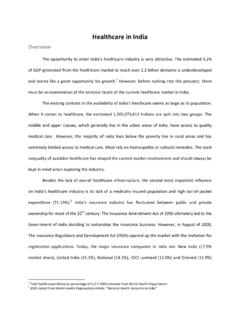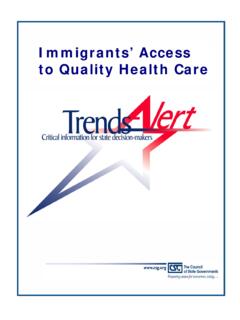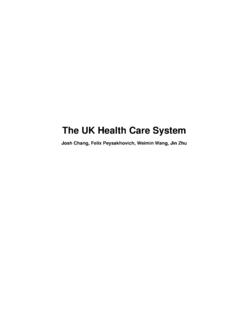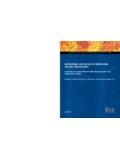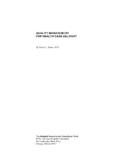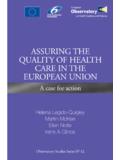Transcription of First-ever global study finds massive health care inequity
1 First-ever global study finds massive healthcare inequity18 May 2017 Credit: CC0 Public DomainA First-ever global study finds massive inequity ofaccess to and quality of health care among andwithin countries, and concludes people are dyingfrom causes with well-known treatments. "What we have found about health care accessand quality is disturbing," said Dr. ChristopherMurray, senior author of the study and Director ofthe Institute for health Metrics and Evaluation(IHME) at the University of Washington. "Having astrong economy does not guarantee good healthcare . Having great medical technology doesn'teither. We know this because people are notgetting the care that should be expected fordiseases with established treatments."For example, on a scale of 1 to 100 for health careaccess and quality , Norway and Australia eachscored 90 overall, among the highest in the , Norway scored 65 in its treatment fortesticular cancer, and Australia scored 52 fortreating non-melanoma skin cancer.
2 "In the majority of cases, both of these cancers canbe treated effectively," Dr. Murray said. "Shouldn'tit cause serious concern that people are dying ofthese causes in countries that have the resourcesto address them?"The top-ranked nation was Andorra with an overallscore of 95; its lowest treatment score was forHodgkin's lymphoma at 70. The lowest-rankednation was Central African Republic at 29; itshighest treatment score was for diphtheria at Martin McKee, from the London Schoolof Hygiene & Tropical Medicine, who participated inthe study , commented: "Using deaths that could beavoided as a measure of the quality of a healthsystem is not new but what makes this study soimportant is its scope, drawing on the vast dataresources assembled by the global Burden ofDisease team to go beyond earlier work in richcountries to cover the entire world in great detail, aswell as the development of a means to assess whata country should be able to achieve, recognizingthat not all are at the same level of the world's governments move ahead toimplement the goal of universal health coverage, towhich they committed in the SustainableDevelopment Goals, these data will provide anecessary baseline from which they can trackprogress.
3 "The United States had an overall score of 81, tiedwith Estonia and Montenegro. As with many othernations, the US scored 100 in treating commonvaccine-preventable diseases, such as diphtheria,tetanus, and measles. But the US had ninetreatment categories in which it scored in the 60s:lower respiratory infections (60), neonatal disorders(69), non-melanoma skin cancer (68), Hodgkin'slymphoma (67), ischemic heart disease (62),hypertensive heart disease (64), diabetes (67),chronic kidney disease (62), and the adverseeffects of medical treatment itself (68)."America's ranking is an embarrassment, especiallyconsidering the US spends more than $9,000 per 1 / 3 person on health care annually, more than any othercountry," Dr.
4 Murray said. "Anyone with a stake inthe current health care debate, including electedofficials at the federal, state, and local levels,should take a look at where the US is falling short."The study was published today in the internationalmedical journal The Lancet, and represents the firsteffort to assess access and quality of services in195 countries from 1990 to 2015. Researchersused a healthcare access and quality (HAQ)Index, based on death rates from 32 causes thatcould be avoided by timely and effective medicalcare, known as "amenable mortality."Scores were based on estimates from the annualGlobal Burden of Diseases, Injuries, and RiskFactors study (GBD), a systematic, scientific effortto quantify the magnitude of health loss from allmajor diseases, injuries, and risk factors by age,sex, and population.
5 With more than 2,300collaborators in 132 countries and 3 non-sovereignlocations, GBD examines 300-plus diseases addition, data were extracted from the mostrecent GBD update and evaluated using a Socio-demographic Index (SDI) based on rates ofeducation, fertility, and income. SDI goes beyondthe historical "developed" versus "developing"nations. Previous assessments of health qualityand access were limited primarily to high-incomecountries, particularly in Western in much of sub-Saharan Africa, as well asin south Asia and several countries in LatinAmerica and the Caribbean, experienced thelowest rankings. Nonetheless, many countries inthese regions, including China (score: 74) andEthiopia (score: 44), have seen sizeable gainssince paper does offer some favorable signs ofimprovement in health care access and 1990, several countries have achievedprogress that met or surpassed levels reached byother nations of similar development.
6 Thesecountries included Turkey, Peru, South Korea, theMaldives, Niger, Jordan, and several WesternEuropean nations such as Switzerland, Spain, plans each year to update the report," healthcare access and quality Index based onmortality from causes amenable to personal healthcare in 195 countries and territories, 1990-2015: anovel analysis from the global Burden of DiseaseStudy 2015." It aims to use these results to betterunderstand gaps and opportunities for improving health care access throughout the healthcare access and quality (HAQ) Index isa summary measure based on 32 causes, that inthe presence of high- quality health care , should notresult in death. These 32 causes were selected aspart of research that Professor Martin McKee andDr.
7 Ellen Nolte, both co-authors in this study , beganin the early 2000s. The causes are:TuberculosisDiarrhea-related diseasesLower respiratory infectionsUpper respiratory infectionsDiphtheriaWhooping coughTetanusMeaslesMaternal disordersNeonatal disordersColon and rectum cancerNon-melanoma skin cancerBreast cancerCervical cancerUterine cancerTesticular cancerHodgkin's lymphomaLeukemiaRheumatic heart diseaseIschemic heart diseaseCerebrovascular disease (stroke)Hypertensive heart diseaseChronic respiratory diseasesPeptic ulcer diseaseAppendicitisInguinal, femoral, and abdominal herniaGallbladder and biliary diseasesEpilepsyDiabetes mellitusChronic kidney diseaseCongenital anomalies 2 / 3 Adverse effects of medical treatment Provided by Institute for health Metrics andEvaluationAPA citation.
8 First-ever global study finds massive health care inequity (2017, May 18) retrieved 25 November 2018 from document is subject to copyright. Apart from any fair dealing for the purpose of private study or research, nopart may be reproduced without the written permission. The content is provided for information purposes by TCPDF ( ) 3 / 3



